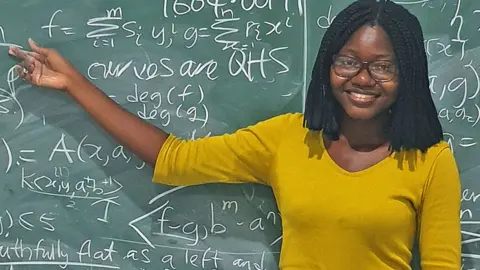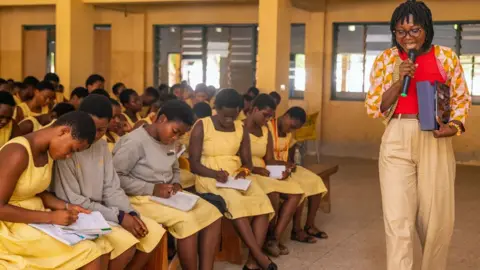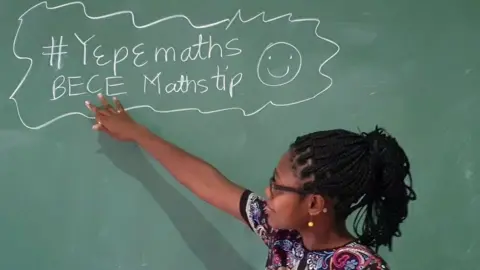
 Angela Tabiri
Angela TabiriDr. Angela Tabiri, known in Ghana as the “Queen of Mathematics,” is the first African to win a major Internet mathematics competition – a feat for someone who has barely studied mathematics. A considerable achievement.
The 35-year-old Ghanaian “finds joy in solving puzzles and mathematical problems” and hopes her victory in 2024 will open doors to the world of mathematics for other African women – a subject they have traditionally been discouraged from studying .
Sixteen mathematicians were invited to compete for the tongue-in-cheek title of “The World’s Most Interesting Mathematician” – a public poll launched in 2018 by The Aperiodical blog.
The first recipient was Dr Neela Chamberlain, the first black mathematician to be included in the British reference book Who’s Who and vice-president of the professional body the Institute of Mathematics and Its Applications.
During the competition, they all compete against each other – two in each competition – and then advance to the quarter-finals and semi-finals, until the all-important competition of who explains the mathematical concept of their choice in the most enlightening way .
Dr. Tabiri is passionate about quantum or non-commutative algebra, and she conducts research at the African Institute of Mathematical Sciences (Aims), Ghana.
The aim is to start in South Africa and then expand to Ghana, Senegal, Cameroon and Rwanda – to provide postgraduate training and research in science, technology, engineering and mathematics.
Dr. Tabiri is also the Academic Manager of the Girls Math Science Program, a mentoring and support program for girls in high school or secondary schools in Ghana.
It was established by Aims-Ghana in 2020 to “ensure that we have a pipeline of young girls who will lead the way in mathematical research and innovation in academia and industry”.
 Angela Tabiri
Angela TabiriDr. Tabiri said roughly equal numbers of girls and boys studied mathematics in high school, but the number of girls and boys studying mathematics at the university level had declined.
Part of the problem, she said, is that female students believe that if they study math, the only job they can do is teaching, because math is still seen as “a boy’s subject” — and there are few female role models.
This is something Dr. Tabiri is trying to change.
But her path to mathematics was not an easy one.
She grew up in Assherman, one of the poorer, more densely populated communities in Tema, an industrial center and port an hour’s drive east of the capital, Accra.
Her home was happy but noisy – she had four sisters – and Dr. Tabiri often visited the local youth community center in search of quiet where she could study.
She wants to follow in the footsteps of her two sisters and study business administration at university.
But her grades, while high, were not high enough, so she was admitted in math and economics.
“It’s really a blessing in disguise,” Dr. Tabiri said. “Numbers and puzzles fascinate me – but I never thought a career in mathematics would be for me.”
In 2015, Dr. Tabiri received a PhD scholarship from the University of Glasgow, Scotland. It was hard work, she says—and it was there that she experienced a seminal moment.
She went to see “Hidden Figures,” which tells the story of African-American female mathematicians who worked at NASA during the segregation-era United States in the 1950s.
“It was amazing to see the stories of these black women on a global stage,” she recalls. “I got a lot of goosebumps when I watched it.”
She was particularly inspired by Katherine Johnson, whose extraordinary mathematical skills and calculations were crucial to the success of American spaceflight.
“Katherine Johnson worked very hard, and for a long time her work was hidden. She made me realize that I had to keep going.
“If your work isn’t recognized now, it will be recognized at some point in the future. That was a real turning point for me.”
In 2024, Ghana reached a historic milestone when Dr. Gloria Botchway became the first woman to earn a PhD in Mathematics from the University of Ghana.
It was a journey filled with hardships – including selling water and yams on the roadside at the age of six.
Dr. Tabiri is working to support other African girls and women from poor backgrounds in pursuing their mathematics dreams through her FemAfricMaths non-profit organization.
Along with other volunteers, she teaches classes to the youngest high school students in person and online.
She also posts her interviews with top female mathematicians from around the world on social media.
Dr. Tabiri is also passionate about the potential of quantum science and technology – for which mathematics is crucial.
She is proud that Ghana, with the support of Mexico, has taken the lead in proposing to designate 2025 as the United Nations International Year of Quantum Science and Technology to commemorate the 100th anniversary of the discovery of modern quantum mechanics.
The study of quantum mechanics reveals how ultra-tiny particles – the most fundamental parts of matter, energy and light – interact to make the world.
It led to the development of the Internet, solar cells, and global navigation satellite systems.
Researchers and large tech companies from around the world, including China, the United States, the United Kingdom, Australia and South Africa, are now racing to develop quantum technologies, including quantum computers and ultra-precise measurement and sensor equipment.
Complex problems are expected to be solved at lightning speed, and huge innovations will occur in areas such as medicine, environmental science, food production and cybersecurity.
“There’s a lot of discussion now – the pros and cons – of the jobs that will be created,” Dr Tabiri said.
 Angela Tabiri
Angela TabiriAccording to the United Nations, Africa’s population is growing rapidly and has become the youngest country in the world. By 2040, Africa will become the world’s largest labor market.
“But that doesn’t mean we’re going to get those jobs,” Dr. Tabiri said.
She hopes to organize a “quantum roadshow” as a first step in introducing quantum science to elementary school students much younger than herself.
“We want young people to start developing interests and develop all relevant skills during basic education,” she said.
The roadshow will be based on a quantum computing course she recently conducted for middle school girls attending classes in Aims-Ghana during the holidays.
The course discusses what is needed to build a quantum computer, its current vulnerabilities, and the challenges quantum computing poses to current systems such as cryptography.
Dr. Tabiri will also collaborate with UNESCO to host a week-long “Quantum Hackathon” in Aims-Ghana in July for approximately 40 graduate students from different African countries.
“We want them to use their quantum skills to solve some of the biggest challenges we face, real-life problems,” Dr. Tabiri said.
“It is extremely urgent that we prepare our young people for the next great revolution.”
You may also be interested in:
 Getty Images/BBC
Getty Images/BBC








